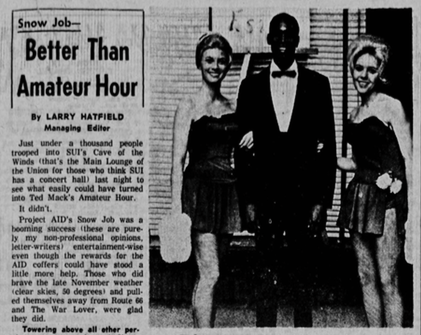Editor’s note: The Old Gold series provides a look at University of Iowa history and tradition through materials housed in University Archives, Department of Special Collections, University of Iowa Libraries.
Here’s a mind trick: Have you ever experienced an event without realizing that it may take on some significance in the future? A concert, perhaps, featuring an unknown band destined for greatness? In the moment, you enjoy the music but have no idea what it may portend.
It’s happened to Old Gold, who to this day still kicks himself for not saving his tape recording of Jimmy Carter’s 1975 appearance at a labor hall in Charles City, Iowa. Old Gold was in his first year in college and working as a stringer (journalism lingo for reporter-who-files-stories-but-not-for-a-living) for a Mason City radio station. It was during the “Jimmy Who?” phase of his political career.

A crystal ball would solve this matter, of course, but who can afford one?
Old Gold thought of this as he was searching through some back issues of The Daily Iowan following the death of Al Jarreau on Feb. 12. Alwin Lopez “Al” Jarreau was, of course, an acclaimed singer and musician, a seven-time Grammy winner who was born and raised in Milwaukee, Wisconsin, and an alumnus of the University of Iowa, where he received a master’s degree in vocational rehabilitation in 1964.
The fact that Mr. Jarreau was not majoring in music or wouldn’t perform onstage professionally for several years didn’t prevent him from appearing in a program to benefit a campus charity on the night of Friday, Nov. 30, 1962, only three months after he arrived in Iowa City after completing his bachelor’s degree at Ripon College in Wisconsin.

The next day, an enthusiastic review of the benefit show by managing editor Larry Hatfield appeared on the front page of The Daily Iowan. He noted Jarreau sounded like “a combination of Johnny Mathis and a 1947 Billy Eckstine.”
But that wasn’t all. Appearing on the stage earlier that same evening was Simon Estes, the native of Centerville, Iowa, who went on to international acclaim as an operatic singer. Mr. Estes entered the University of Iowa in 1957; by 1962, he was embarking upon a remarkable career, as noted by Mr. Hatfield:
“Towering above all other performances was that of Simon Estes, probably the Midwest’s most gifted singer. Estes received one of the rare standing ovations (that evening).”
Imagine two luminaries in one evening, both at the dawn of remarkable careers. Old Gold would like to know if you were there that night. If so, we would like to hear from you. And if you happen to find a tape recording of Jimmy Carter’s October 1975 appearance in Charles City, please let Old Gold know of that too.